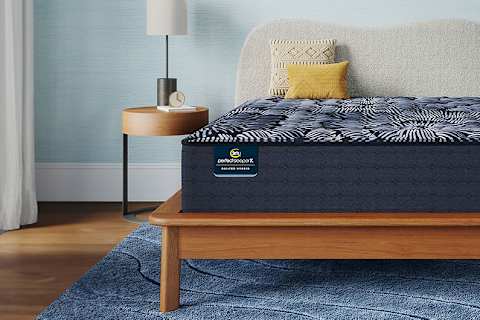Advertisement
5 Expert-Backed Tips For Better Sleep Tonight + An Editor-Approved Mattress Rec

It’s the sleep we all dream of: Going to bed on a comfortable mattress, easily drifting off into lullaby-like rest, and waking up refreshed and restored. It’s the sort of sleep that allows us to perform our best, live healthy lives, and thrive.
For lots of folks, this sort of sleep sounds like an all-too-perfect, unattainable aspiration. In fact, a 2024 Gallup poll found that 57% of Americans wish they had higher quality sleep, saying they’d “feel much better if they got more sleep.”
This begs the question: How do we actually get better sleep?
It’s time to talk about sleep
Recently, we hosted the mindbodygreen and Serta Perfect Sleep Summit in Los Angeles. We gathered our favorite experts and thought-leaders in the world of well-being to share their tips on how to actually achieve high quality sleep.
Featuring a calming Yoga Nidra class led by yogi Caley Alyssa, personalized sleep consultations with wellness experts, and an engaging panel featuring top experts neuropsychologist Judy Ho, PhD and performance optimization expert Todd Anderson, this summit was the perfect event for anyone who needs help improving their sleep quality.
While there, guests also tested out the Serta Perfect Sleeper X, a mattress designed to help you optimize rest and achieve Xtraordinary sleep.
Featuring 5 support zones designed for full-body alignment, it helps you stay comfortable throughout the night no matter your sleeping style. It also uses both Perfect Conform™ premium memory foam and micro coils, which means it contours to your body and provides targeted pressure relief. The Xtra cooling technology and graphite-infused memory foam redistributes body heat, so it stays cool while you rest.
Experts share their 5 best sleep tips
During our sleep panel with Anderson and Ho, we got to ask them our most pressing questions about sleep—and they even shared what they do for themselves.
1. Reframe your mindset
Both Anderson and Ho emphasized that we need to change the narrative around rest. In today’s culture—one that still glorifies hectic schedules and doing-it-all attitudes—sleep is often at the bottom of our priority lists. But a good night’s rest is not something you have to “earn.” Rather, it is what enables you to do all of the other things that need to get done during a busy day.
“There is such a hustle culture still. Even though people are talking about self care more, most folks aren’t really doing it,” says Ho. She noted a recent study that found that less than 10% of Americans are actually practicing self care on a daily basis. “I think people still have a stigma around self care, and certain beliefs about it. It’s still viewed as a luxury that you have to ‘deserve.’”
Anderson agrees: “In order to [be extraordinary], you have to be your best self. And when you’re not taking care of yourself—especially with sleep—you’re not able to do that. It’s reframing the mindset to: ‘If I want to be my best self, sleep has to be carve out.’”
“In order to [be extraordinary], you have to be your best self. And when you’re not taking care of yourself—especially with sleep—you’re not able to do that. It’s reframing the mindset to: ‘If I want to be my best self, sleep has to be carved out.’” — Anderson
2. Learn ways to regulate your nervous system
The hard truth is that when we de-prioritize sleep, our bodies and minds suffer. This is because of sleep’s influence on the nervous system.
“When you sleep, your cortisol levels are supposed to drop. When you wake, these levels slowly start to climb. In moderation, cortisol is actually very good for you: It makes you productive, have energy, and helps you accomplish all these things you need to do,” says Ho, host of the podcast Mental Health Bites with Dr. Judy and author of the two books The New Rules of Attachment and Stop Self-Sabotage. “But it needs time to come down at night. There’s supposed to be a biological rhythm to it. If you don’t get good quality sleep, it doesn’t come down so you start your morning already at a more elevated level.”
This is an issue, explains Ho, because elevated levels of cortisol influences our mood, ability to react to stressful situations, and even cognitive performance, like memory and attention.
“But the great thing is in very short amounts of time—literally in under a minute—you can regulate your nervous system,” she explains. “All you have to do is, throughout the day, take 10 deep breaths. It sounds so simple, but what it does is it tells your brain and your body, ‘Oh there’s no emergency right now. We’re not in fight-or-flight mode.’ Because if you were in fight-or-flight, you’d not have the luxury of being able to breathe deep.”
3. Practice nasal breathing for stress regulation
On the subject of breathing, the topic actually came up a lot over the course of the evening. Breath can be an incredibly useful tool to monitor and manage your stress throughout the day and night.
“Breath is really the steering wheel for the nervous system. It is a very quick and effective way to regulate the nervous system," says Anderson, the founder of Dream Performance & Recovery and host of the podcast Beat The Heat.
“Breathing through your nose downregulates your nervous system, which allows you to relax. It also brings awareness to your breath,” says Anderson. “It’s as simple as breathing through your nose, then making sure your exhale is longer than your inhale. It makes an immediate impact.”
4. Be mindful of your habits throughout the day
Your bedtime routine starts the moment you wake up—yes, really. What we do in the first moments of waking and throughout the day can deeply influence our ability to fall asleep again at night.
“I don’t know anyone who can be stressed during the day, then fall asleep instantly at night. They’ll say, ‘Oh, I can’t sleep,’ but it actually has nothing to do with sleep. It has more to do with stress regulation and your daily habits,” says Anderson.
One way to start the day off right is to curate a mindful morning routine.
“A morning routine is just as important as a nighttime routine,” says Ho. “The first thing I do every morning is the ‘three things’ practice. I say three things I am grateful for. It’s really important that you orient your mind to the positive. Why? Because our minds generally, and universally, gravitate towards the negative as a survival technique.”
As for Anderson, he points to exercise as one of the most impactful ways to get your body to sleep later in the day. “Exercise is net positive across the board for sleep,” he says.
5. Understand that you cannot “tough it” through a bad night’s rest
As Ho explained, lack of sleep affects a variety of mental and physical functions. And these have real life implications. For example, the elevated cortisol levels influence our decision making1, meaning we’re less rational in how we come to conclusions. Sleep also disrupts our “happy hormones” like serotonin and dopamine2, so we have less capacity to regulate our mood. It can also hinder cognitive performance3, impacting our reaction time, memory, and more.
And these influences are not things we can overcome through sheer willpower—try as we might.
“When you listen to the things that sleep impacts, none of that are things you can power through. They are subconscious reactions from the brain that you really have no control over,” he says. “So when people talk about being overslept, they say ‘oh i'm tired i feel tired’ but what’s actually happening are subconscious things happening in our brain that we can control, like reaction time. You actually can’t tough through a bad night’s sleep.”
The only solution, Anderson explains, is to get enough sleep. “Sleep is our ultimate reset for the brain and body.”
An Xtraordinary mattress to support you on your sleep journey
Of course, one of the most important things to consider when evaluating your sleep habits is what you’re sleeping on. Having the right habits and relaxation techniques can certainly help improve sleep quality, but your sleep will ultimately be impacted by the type of mattress you choose.
Serta Perfect Sleeper X gives your body the support it needs to achieve that deep, quality sleep you long for. With Xtra benefits like Xtra cooling technology and Xtra support (including memory foam and micro coils), this may be your perfect sleep solution.


